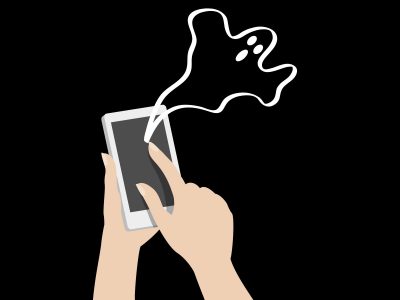People have been pulling disappearing acts for ages.
Famed mystery writer Agatha Christie disappeared for 11 days in 1926, only to be found later at a Yorkshire spa checked in under the name Tressa Neele.
While the cause of her disappearing act remains unknown, a prevalent theory contends she drove off into the night after discovering her husband was having an affair with another woman. The author refused to ever speak of the incident and divorced her husband two years later.
Christie did not succeed in ghosting her husband, or her old life.

But in those 11 days, she managed to escape other people’s perception of her. For 11 days, she no longer had to be someone whose husband had cheated on her. She could shed these parts of her identity, because as Neele, she no longer held the social ties that defined Agatha Christie as a person.
These days, the most common way to disappear from someone’s life is to ghost them — to completely and suddenly cut off communication with someone. This disappearing act often happens through text or social media platforms.
And though this practice can be incredibly hurtful and rude, it is, in some cases, one of the best ways to say goodbye.
There are generally three types of ghosting: One, you ghost someone in order to leave a genuinely harmful and abusive situation.
Two, you ghost someone because you do not want to deal with any added responsibility.
Or three, you ghost someone because your personalities simply didn’t click.
I will mostly be discussing the third kind because I believe the first two are much more clear-cut in regard to their ethics. Ghosting an abuser is justified because you do not owe an abuser an explanation for leaving if it is safe to do so. Ghosting your children as a parent, by contrast, is not justified for many reasons, the most obvious being they depend on you to survive.
The third scenario is more complicated. I’ve often seen people — including myself — treat social interactions as indicators of self-worth. For some, self-improvement can only be achieved through other people.
Ghosting, then, creates a tricky problem under this system. How can you build a sense of self or improve yourself if the feedback you rely on is missing?

Psychology articles claim people ghost others because of a fear of conflict or confusion. People sometimes can’t understand their feelings or discomfort in a situation, so they decide to fade away instead of confronting their emotions.
These articles also describe the pain of ghosting and the lack of closure. If someone ghosts you, you are left without any explanation — why did they decide to leave us without a word?
But I feel these assumptions do not respect people’s autonomy enough. Ghosting is more than just a fear of conflict — ghosting also implies a refusal to provide an explanation for one’s actions. It is a refusal to participate in the kind of feedback loop we use to define our own personhood.
The quest for self-improvement and self-care can lead us to seek validation and affirmation from others in order to better ourselves. For a while, I thought this was the most empathetic thing you could do: If you’re aware of how others perceive you, then you can be more considerate of their needs.
But I find this mentality makes you even more self-obsessed. You’re not really thinking about the other person, you’re only thinking about them in relation to you. And you’re doing the same thing to yourself — you’re only thinking about yourself in how you relate to others.
To be clear, I do not mean you should ignore your friends when they try to tell you you’re doing something wrong or hurtful. There is a difference between listening to a friend about your potentially harmful behavior and being dependent on random interactions with people you barely know to define your sense of self.
It can get tricky if you begin to base your entire existence on others’ feedback. When you escape that cycle, you may find it difficult to separate what part of you is you and what part of you was created to cater to others.
That’s no way to live.
It is important to hold space for the unexplained, for a bad grade without a note at the end and for ambiguity.
Yeah, you got ghosted. You lost out on a valid piece of customer feedback.
But it is in that ambiguity, in that absence, that you can more strongly build upon your concept of self — the part of you that exists outside of anyone else. Sometimes it’s better to leave things unexplained.
Ghosting may be incredibly rude for someone to do, and it shouldn’t be the only way to end a relationship or interaction, especially a serious one. I try not to end most interactions by ghosting, but I think sometimes it’s natural and justified to say goodbye by disappearing.
It affords you the reminder that other people’s feedback doesn’t make you any more real or worthy. And it allows the ghoster the kindness of not having to participate in a feedback loop that may only serve to push the two of you farther from your actual selves than you already are.






















































































































